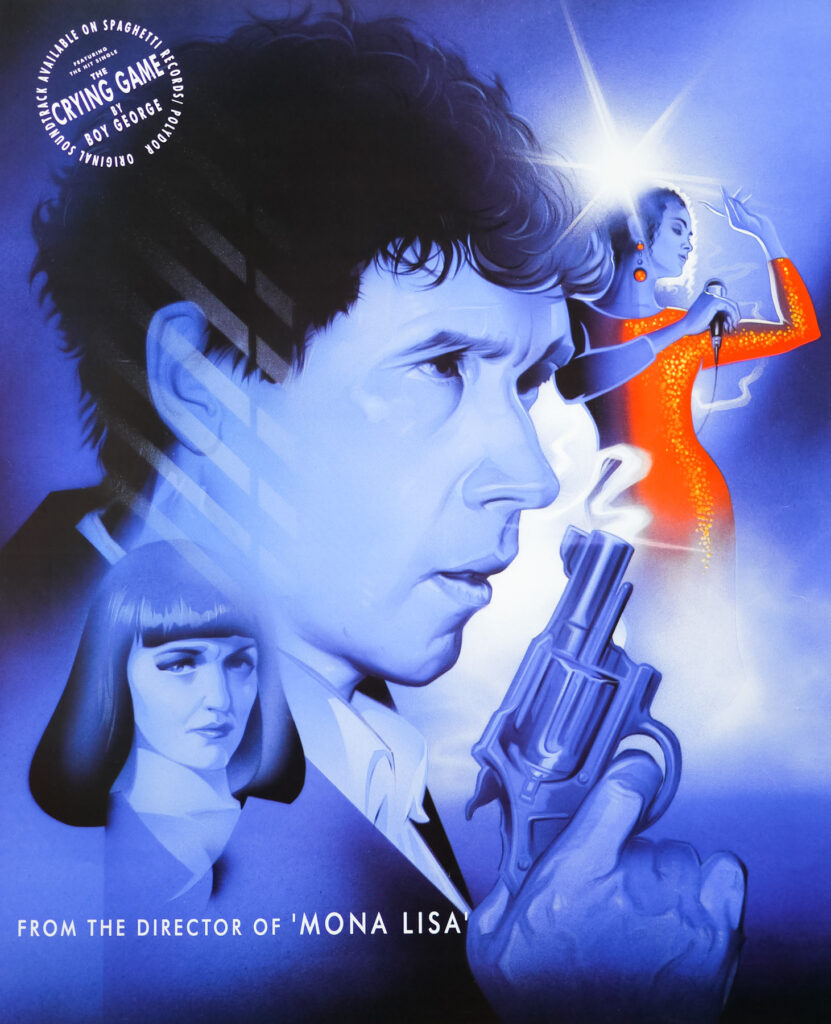
Response to SUPERLUX Summer School with Kathryn Elkin commissioned by LUX Scotland
When I got home I watched The Crying Game (1992). I had been wanting to watch this for a long time.
The crying game considers histories of oppression and struggles for liberation. It looks at an intersection of racism, transphobia and occupation. It sits uncomfortably at the lines of national, platonic and romantic bonds. What interested me in the film, other then the 1990s aesthetic and the queer social space of the pub, is legibility, and belonging.
Despite the iconic imagery of Dil performing in that sequined dress, and Miranda Richardson as an own brand Dolours Price, the film also explores legibility through voice and dialogue. Dil’s use of pet names and Fergus’ discomfort with this. Unrequited affection from a Fergus is familiar to me. Accent as geographic and familial tie. Fergus’ line ‘She’s not a girl, Col’. Does Dil’s voice give her away, or does it pass?
As a child I stopped speaking for a while and had to go to speech therapy. I’ve always felt uncomfortable that my voice wasn’t masculine enough, therefore likely to incite violence and make me unlovable, even when the realisation of being non-binary finally settled in. Speaking in public feels like an active and sometimes frightening activity.
Jaye Davidson who played Dil mainly retired after The Crying Game, uncomfortable with the fame – visibility? legibility? – it brought. In an interview in 1993 Jaye said:
‘To be homosexual is to like the ideal of the sex. Homosexual men love very masculine men. And I’m not a very masculine person. I’m reasonably thin. I have long hair, which isn’t very popular with gay men. My behavior is often appalling. And I have a terrible reputation in London for being one of the unapproachables.’ 1
Legibility comes with the risk of rejection, like the public speech act. Like losing an accent due to education or speech therapy, which can lose the familial and geographical bonds of belonging.
Dolours Price was married to actor Stephen Rea at the time of the film. Price and her sister were important members of the Provisional Irish Republican Army, where silence and double speak were essential. At the end of her life she spoke at length in interviews for Boston College about her activities in the provisional IRA. Essential to these interviews was having someone with proximity to the provisional IRA conducting the interview, to put the participant at ease so they would be more open.2 Due to power dynamics there I have a discomfort with the oral history interview as a potentially exploitative form, whilst really wanting to emphasise lived experience and testimony. Are you allowing the participant to be more than an informant? Was this speech act a betrayal or a continuation of a liberatory politics? Can the voice be used as a technological tool for liberation from colonial, socio-economic and gender oppressions?
‘It aches to know. And yet, there was a pleasure to the stepping through it. The liberation feeling the ground crunch. My heart is racing. She thought, I’d want it more than anything. She thought. Somewhere, perhaps right at that moment. Or even right at that space, someone was and had been. Right there with her. Like a knowing, like an old friend. The wild was a serenity, clean like a mine. And when she could no longer sense. If the others would keep pace. She found her own, and there was a pleasure in stepping through it. Some of us might get free.’3
1 Jiles, G. The Open Secret — In A Rare Interview, Jaye Davidson Leaves Nothing To The Imagination When
Discussing The Oscar-Nominated Film, `The Crying Game’, Seattle Times, (1993) accessed 03/11/2021
(https://archive.seattletimes.com/archive/?date=19930322&slug=1691795)
2 Keefe,Patrick Radden. Say Nothing: A True Story Of Murder and Memory In Northern Ireland. (2018) HarperCollins;
London.
3 TYGAPAW. Get Free Intro – ft. Mandy Harris Williams. from TYGAPAW, Get Free (2020) N.A.A.F.I: Mexico.
https://tygapaw.bandcamp.com/album/get-free